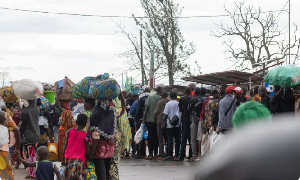The Government has introduced an alternative livelihood programme for 18 districts severely affected by illegal mining ‘galamsey’ as part of plans to discourage the practice in the country.
The programme, currently underway in five regions of the country and involves 500 small-scale miners (galamsey operators), was being championed by the Inter-Ministerial Committee on Illegal Mining and implemented by the Ministry of Local Government and Rural Development.
Hajia Alima Mahama, the Sector Minister, who announced this at the meet-the-press series in Accra on Wednesday, said the beneficiary communities were assessed and enrolled onto various technical and vocational training programmes in automobile engineering, plumbing, building and construction, dressmaking, catering, and hairdressing among others.
The Minister said the one-year training programme was expected to provide them with basic skills in the various disciplines, adding that beneficiaries could pursue further studies in their chosen field for an extra year to earn certification to practice.
She said those pursuing automobile engineering included senior high school graduates who had the potential to pursuing same at the tertiary level.
The beneficiaries would be provided with some startup capitals and tools to enable them to practice after the training, the Minister said.
All beneficiaries are on paid boarding training with a total cost of GHS650 on each trainee per term,” she said.
In addition to the institutional training, other 370 beneficiaries had commenced community level training with various master craftsmen in the galamsey community.
She said the Ministry was promoting the use of clean cookstoves in households and some schools to help prevent women from contracting diseases resulting from harmful cooking practices.
Hajia Mahama said reports had indicated that more than 30 per cent of women suffered respiratory diseases due to the kind of fuel sources they used.
The Ministry was, therefore, supporting the clean cook initiative to foster climate change adaptation and resilience measures.
Business News of Thursday, 30 May 2019
Source: ghananewsagency.org













